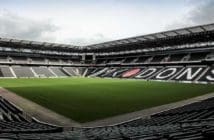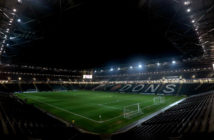“I didn’t like who I was as a footballer, looking back, I didn’t like what I was. Now, it’s a lot easier to be who I want to be and who I am because I’m not a performing dog anymore. I don’t have to be what I needed to be then. What I needed to be then was the best I possibly could be to the detriment of most of the other stuff in my life. Now I don’t have to do that, it’s a far easier life and I’m far happier.”
The most decorated footballer in the history of Everton Football Club, the last goalkeeper to be voted Football Writers’ Player of the Year, the winner of two league titles, two FA Cups and a European Cup Winners’ Cup venerated as the best of his generation and a living legend in his lifetime, Neville Southall is now far more famous for standing up for people without a voice in mainstream society than for standing up to attackers bearing down on his goal.

Asif Burhan spoke to former Everton and Wales goalkeeper, Neville Southall about his work promoting LGBT rights.
Picture: Asif Burhan
Southall’s commitment to his various charities and causes often extend to him surrendering his social media account to organisations that lack his mass following, allowing them a chance to further their work and crush widely-held misconceptions. Helplines for workers in the sex industry, drug users, those coping with suicide bereavement and this week, victims of sexual violence have all been given a forum of over 146,000 people on Southall’s Twitter account. So what made this former international goalkeeper such a crusader for marginalised groups?
“When I played for Wales we went to some of the poorest countries in the world, I went to Romania when Ceausescu was there, the old Yugoslavia when Tito was there, you can see the poverty. When people try and nick your brown sauce and your red sauce off your table because they have nothing then you realise how bad it is. Since leaving football, I’ve always worked with disadvantaged kids and that’s the main reason for it really”.
So why speak out now, 17 years after he finished playing and a decade after his last involvement in the game?
“As a footballer you have to be really self-centred, have a massive ego and just worry after yourself. Once you go into that profession, you are judged every day and every week. At the time you just put your head down and do what you can do. What I probably should have done was have a better work-life balance, but I didn’t because I wanted to be something that I wanted to be, which was to be the best I possibly could”.
It is that reputation, forged over three decades on the football field, which means that Southall is listened to. He is at Wembley as a patron of the LGBT group Just A Ball Game at their first-ever seminar called Stronger Together, the culmination of a lifetime’s work from their founder Lindsay England, a tireless campaigner for equality in all fields. In England, Southall has met a kindred spirit.
“I met Lindsay through Twitter, what I like about Lindsay is she just grafts and grafts and grafts. She doesn’t get much funding. She’s always looking for new funding, always keen to promote it. I think when you’ve got people like Lindsay, LGBT people have got a chance at succeeding in football”.

Neville Southall speaking at Just a Ball Game’s Seminar “Stronger Together” at Wembley Stadium.
Picture: Asif Burhan
Southall’s passion for LGBT issues derive from when a boy he was teaching in Ebbw Vale came out.
“In the process, you think, “how am I ever going to be able to speak to this kid?” What do I actually know about LGBT stuff? Nothing. I didn’t think I knew anyone who was gay at that time, but I must have, and I must have played with someone who was gay, by sheer averages. I contacted a few people on Twitter and they’ve been brilliant. They gave me good advice”.
“What I didn’t realise until I finished football is the impact that your words can have on people. Your words do have an effect and I think sometimes you have got to sit back and realise what words can mean. I think that one of the things is if you use the “N” word (in football), you get sent off; if you call someone a “queer” you don’t get sent off. I think that’s wrong, I think that should be addressed. Why is one different from the other? Both two words are the same”.
“It seems to me that sometimes the FAs want to tick off stuff, you can’t just tick boxes. Tell me an FA Cup Final or one of the other finals when you have ever anything with LGBT around it? There are our show-pieces and yet we don’t do anything. When you have “Rainbow Laces Day” have the ball, the referee, the corner flags, the nets, the mascot, stuff around the ground all in rainbow colours, have workshops around the grounds, so you’re actually meeting people. If we’re going to host something, it’s no good going to talk to people who are already converted. The people who you want to get out are the fans on the terraces”.
“Why can’t we show the world that we’re taking it seriously instead of going “we’ll have a talk”? I’d love to see the stewards trained properly and have cameras on their tops like the police do. I’d like them to film the people and get them banned for life. You can’t just play on, you’ve got to stop it, if you don’t stop it, it’s going to carry on. What are we saying? We’re saying this is wrong and if you say it, you’re out and you don’t come back. We need to lead by example”.
![Prost International [PINT]](https://prostinternational.com/wp-content/uploads/2021/08/PINTtFontLogoRoboto1536x78.jpg)



